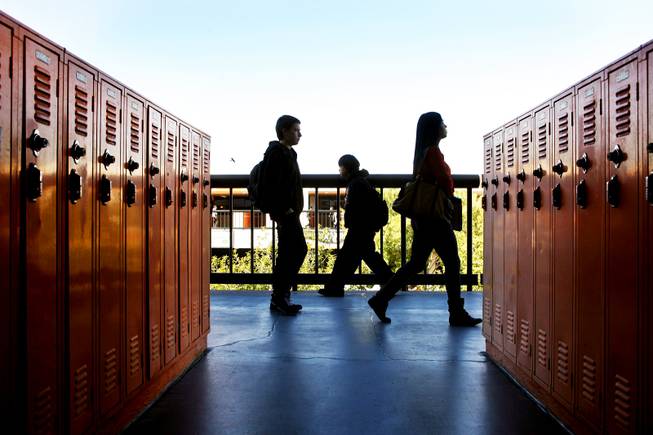
Students walk between classes at Chaparral High School in Las Vegas on Wednesday, Nov. 9, 2011.
Thursday, Jan. 9, 2014 | 7:13 a.m.
A child growing up in Nevada has the lowest chance for academic success in the country, according to a national study released today.
For the past two decades, Education Week has published an annual report evaluating school systems in 50 states and Washington, D.C.
The 2014 Quality Counts report graded Nevada a “D” on its “chance for success index,” the lowest possible rating. The national average on the index was “C+.”
The Silver State scored at the bottom of the nation in terms of students’ “chance for success,” according to the report. When the “chance for success” index was introduced in 2007, Nevada ranked 43rd; its ranking the past five years has been 51st.
“The Quality Counts report highlights the critical need to continue reforming education in Nevada,” Nevada Superintendent of Public Instruction Dale Erquiaga said in a statement. “I am pleased to see Nevada is making incremental achievement gains over time, but our overall performance continues to lag behind other states. These rankings are one more reminder that Nevada must do more to ensure our students are ready for college and careers.”
Education Week, a Bethesda, Md.-based magazine, looks at 13 indicators to determine a state’s “chance for success” index.
Nevada scored below the national average on all 13 indicators, ranging from participation in early childhood programs and school test scores to adult economic factors. Indicators include parents’ level of education and preschool enrollment figures to the high school graduation rate and unemployment rate.
Despite its abysmal overall ranking, the Silver State showed improvement on some indicators. It even ranked among the top states for gains on a few indicators.
Nevada was among the top 10 states for gains in fourth- and eighth-grade reading scores as well as eighth-grade math scores on a biennial national assessment. In fact, the Silver State doubled the national average gain on eighth-grade reading scores and performed better than the national average in closing the math test score gap for low-income students.
Those successes were outweighed by Nevada’s low graduation rate and students’ proficiency rates on national tests. On Education Week’s student achievement index, Nevada scored 48th nationally. However, between 2000 and 2010, Nevada experienced a 7.4 percent increase in its graduation rate, 17th highest increase in the nation.
Although there were some improvements, Nevada still scored in the bottom 10 states in fourth-grade reading and math and in eighth-grade math. The Silver State’s graduation rate – 63 percent, according to Education Week – ranked 48th nationally.
Clark County Schools Superintendent Pat Skorkowsky, who oversees the state’s largest school system, said he was disappointed by the results and vowed improvements.
“When you’re trying to move the state, it’s going to take some time,” Skorkowsky said. “We’re going to make some significant improvements in the coming year.”
Skorkowsky, like some of his predecessors, took issue with Education Week’s ranking methodology.
Nevada schools were penalized for some external factors – including parents’ level of education, preschool enrollment and the percentage of college graduates – which affected its education rankings.
Only a third of school-aged children in Nevada have at least one parent with a college degree, the lowest percentage in the nation. In addition, only a third of 3- and 4-year-olds attend preschool, also the lowest participation rate nationally.
“We’re dinged on factors outside of our control,” Skorkowsky said. “It’s not fair.”
Also bringing down the state’s education rankings was the level of per-pupil spending. Nevada spends $8,454 per student, which is about $3,000 less than the national average and ranks 49th nationally, according to Education Week.
To improve Nevada’s education system, Skorkowsky said he hoped to focus on early childhood education. Research shows children who fail to read by third grade are less likely to graduate high school.
“In the state of Nevada, there is no preschool plan except for our (English-language learner) and special-education students,” Skorkowsky said. “That’s something we need to change.”

Join the Discussion:
Check this out for a full explanation of our conversion to the LiveFyre commenting system and instructions on how to sign up for an account.
Full comments policy